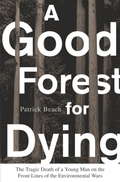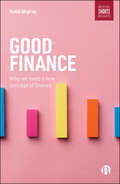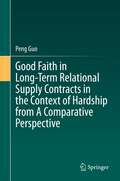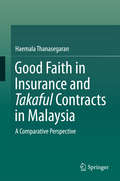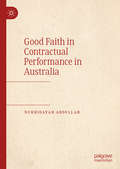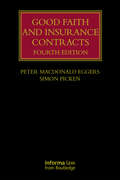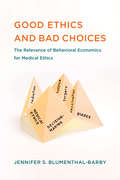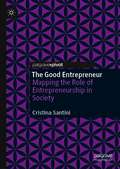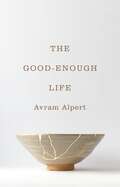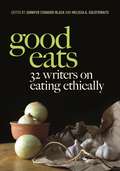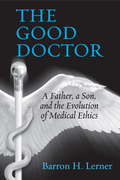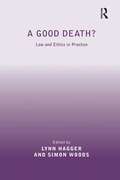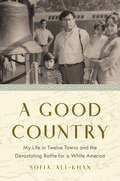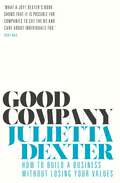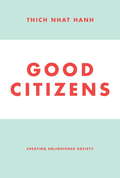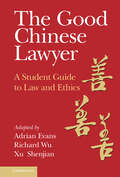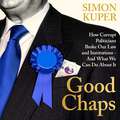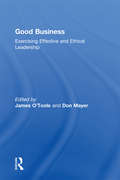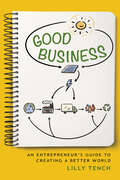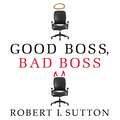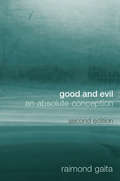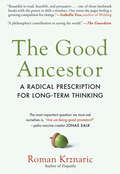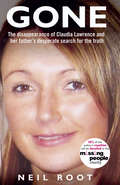- Table View
- List View
A Good Forest for Dying: The Tragic Death of a Young Man on the Front Lines of the Environmental Wars
by Patrick BeachEarly on a September morning in 1998, David "Gypsy" Chain and eight fellow Earth First! activists went into the redwood forests of Scotia, California. Their loosely organized plan to protest the destruction caused by the logging industry almost immediately turned farcically tragic. A. E. Ammons, a logger for Pacific Lumber, confronted the group, threatening them in an obscenity-ridden diatribe: if they didn't leave "I'll make sure I got a tree comin' this way!" The group retreated, moving deeper into the wilderness. A short time later, just as they were attempting to confront the logger yet again, Gypsy was dead, crushed to death by a tree Ammons felled. A GOOD FOREST FOR DYING traces the long history of bitter clashes between environmental concerns and economic interests in the American West and shows why these tensions came to a head in northern California in the 1990s. It tells the story of how Pacific Lumber, once an environmentally friendly, family-owned business, became part of a conglomerate whose business practices made it a ripe target for environmental activists. But A GOOD FOREST FOR DYING is also the story of Gypsy Chain, a troubled young man raised in a loving family. A social misfit in his small Texas hometown, he died in a faraway forest before he had a chance to come to terms with himself and his family. His mother never lost faith in her sometimes wayward, idealistic son. After his death, and helped by a team of shrewd, leftist lawyers, she mounted a fight for justice in the name of her son and the cause of saving the redwoods. A balanced, highly readable examination of complex, emotionally charged issues, A GOOD FOREST FOR DYING will appeal to a wide audience. Its insights into the inner workings of the radical environmental movement and its dissection of corporate greed and misdeeds are reminiscent of such provocative exposés as A Civil Action and Erin Brockovich. The story of Gypsy's strange odyssey and the disturbing circumstances of his death-seen primarily through the eyes of his mother--is as powerful and as moving as Jon Krakauer's classic Into the Wild.
Good Finance: Why We Need a New Concept of Finance
by Vedat AkgirayJust as we need good food for good health, so too do we need ‘good finance’ for social and economic wellness. In this book, Vedat Akgiray presents a timely critique of extreme financialisation, of the economics profession’s flawed modelling approach and the continuing blind faith in the efficient market hypothesis. Outlining the causes of financial crises and their socioeconomic effects, Good Finance puts the issues into perspective. It offers a clear platform upon which our current concept of finance can be revised for the good of society.
Good Faith in Long-Term Relational Supply Contracts in the Context of Hardship from A Comparative Perspective
by Peng GuoThis book provides fair and acceptable solutions to hardship issues in long-term relational supply contracts. This book uses an approach to strike a balance between the traditional approach underlying classical contract law which emphasises the almost absolute prevalence of the principle of pacta sunt servanda and a flexible approach that is based on the principle of clausula rebus sic stantibus. This book argues for an emerging principle of pacta sunt servanda bona fide on the basis of the relational contract theory. Additionally, this book demonstrates how good faith can serve as a foundation for imposing a duty to renegotiate on the parties. The aim of this book is rather to propose how relational contract theory can be applied to the analysis of specific legal rules in general. Lastly, this boos highlights how the duty to renegotiate and the power to adapt a contract can be further developed upon the occurrence of hardship, based on good faith and the relational nature and characteristics of a long-term relational supply contract. This book explores and enriches the existing research on relational contract theory concentrates primarily on its application in domestic contract laws, particularly in the regulation of long-term contracts in American contract law. As an outcome this book provides a more feasible and satisfactory approach for courts or arbitral tribunals to undertake when facing hardship issues in international contract disputes. Overall, hardship themes, long-term relational supply contracts and good faith are examined extensively.
Good Faith in Insurance and Takaful Contracts in Malaysia
by Haemala ThanasegaranThis book examines good faith in non-marine insurance and takaful (Islamic insurance) contracts in Malaysia, and proposes holistic law reform of the same. The first two-thirds of the book comprise an extensive comparative legal analysis of the issues between Malaysia, Australia and the United Kingdom, with the final third dedicated to a socio-economic analysis of law reform and suggestions for law reform particularly suited to Malaysia. The book evaluates whether the duty of utmost good faith (the cornerstone of insurance and takaful contracts) is effectively regulated and, in turn, observed by insurers (and takaful operators) and insureds alike in Malaysia. The adequacy of the Insurance Act 1996 (Malaysia), the Takaful Act 1984 (Malaysia), the Financial Services Act 2013 (Malaysia) and the Islamic Financial Services Act 2013 (Malaysia) is evaluated, along with the supporting infrastructure and oversight measures introduced by the Malaysian government. In doing so, The book examines the duty of utmost good faith from both a doctrinal and a social science perspective, in order to propose suitable legal reform.
Good Faith in Contractual Performance in Australia
by Nurhidayah AbdullahThis book gives a detailed account of the current state of the law concerning good faith in contractual performance in Australia, through an empirical study on its reception and development across the various Australian jurisdictions.In Australia, good faith received wide attention after Priestly J introduced in his obiter comments in Renard Construction (ME) v Minister for Works (1992) 26 NSWLR 234.This book focuses on the attitude of the judges to good faith, the definition of good faith, and the possibility of legislating a good faith obligation in Australian contract law. This book also discusses the issues surrounding its development, its meaning, and acceptance at the international level.The empirical legal research adopted in this book will offer a significant contribution in understanding the concept of good faith in Australia from the empirical perspective.
Good Faith and Insurance Contracts (Lloyd's Insurance Law Library)
by Peter MacDonald Eggers Simon PickenGood Faith and Insurance Contracts sets out an exhaustive analysis of the law concerning the duty of utmost good faith, as applied to insurance contracts. Now in its fourth edition, it has been updated to address the arrival of the Insurance Act 2015, as well as any references to new case law. In addition, it synthesises all known judicial decisions by the English Courts concerning good faith in this area. This book is still the only text devoted to a discussion of the duty of utmost good faith applicable to insurance contracts. As good faith is an issue which arises in respect of all insurance contracts, it is a book which will be extremely useful to lawyers involved in insurance as well as insurance practitioners.
Good Ethics and Bad Choices: The Relevance of Behavioral Economics for Medical Ethics (Basic Bioethics)
by Jennifer S. Blumenthal-BarbyAn analysis of how findings in behavioral economics challenge fundamental assumptions of medical ethics, integrating the latest research in both fields.Bioethicists have long argued for rational persuasion to help patients with medical decisions. But the findings of behavioral economics—popularized in Thaler and Sunstein&’s Nudge and other books—show that arguments depending on rational thinking are unlikely to be successful and even that the idea of purely rational persuasion may be a fiction. In Good Ethics and Bad Choices, Jennifer Blumenthal-Barby examines how behavioral economics challenges some of the most fundamental tenets of medical ethics. She not only integrates the latest research from both fields but also provides examples of how physicians apply concepts of behavioral economics in practice. Blumenthal-Barby analyzes ethical issues raised by &“nudging&” patient decision making and argues that the practice can improve patient decisions, prevent harm, and perhaps enhance autonomy. She then offers a more detailed ethical analysis of further questions that arise, including whether nudging amounts to manipulation, to what extent and at what point these techniques should be used, when and how their use would be wrong, and whether transparency about their use is required. She provides a snapshot of nudging &“in the weeds,&” reporting on practices she observed in clinical settings including psychiatry, pediatric critical care, and oncology. Warning that there is no &“single, simple account of the ethics of nudging,&” Blumenthal-Barby offers a qualified defense, arguing that a nudge can be justified in part by the extent to which it makes patients better off.
The Good Entrepreneur: Mapping the Role of Entrepreneurship in Society
by Cristina SantiniThis book explores the relationship between entrepreneurship and doing good.As research into entrepreneurship has evolved, so has the business environment and the society in which entrepreneurs work. Now more than ever, entrepreneurs are found to reflect on personal commitment, ethical issues and more recently, the influence they could have on society. In short they have embraced the concept of ‘the good entrepreneur.’ Over time many different strands of ‘good’ entrepreneurship have emerged; from social, green and sustainable entrepreneurship to ecopreneurship and so forth. Indeed some strands of research have merged while others have registered a lack of field research and analysis. In this book the author argues that this excessive fragmentation has created the need for a reflection on the role of niches in entrepreneurship. Providing analysis from multiple perspectives, the author provides an overview of the relationship between entrepreneurship and doing good as well as an exploration of the drivers that promote research in this field and an outline of research dynamics.Contributing to the current debate around the field of entrepreneurship and its ability to drive responsible and sustainable business practices, this book presents a comprehensive guide for students (graduate, master and PhD), academics and institutions and offers the reader an enhanced understanding of the evolution and research challenges within 'good entrepreneurship.'
The Good-Enough Life
by Avram AlpertHow an acceptance of our limitations can lead to a more fulfilling life and a more harmonious societyWe live in a world oriented toward greatness, one in which we feel compelled to be among the wealthiest, most powerful, and most famous. This book explains why no one truly benefits from this competitive social order, and reveals how another way of life is possible—a good-enough life for all.Avram Alpert shows how our obsession with greatness results in stress and anxiety, damage to our relationships, widespread political and economic inequality, and destruction of the natural world. He describes how to move beyond greatness to create a society in which everyone flourishes. By competing less with each other, each of us can find renewed meaning and purpose, have our material and emotional needs met, and begin to lead more leisurely lives. Alpert makes no false utopian promises, however. Life can never be more than good enough because there will always be accidents and tragedies beyond our control, which is why we must stop dividing the world into winners and losers and ensure that there is a fair share of decency and sufficiency to go around.Visionary and provocative, The Good-Enough Life demonstrates how we can work together to cultivate a good-enough life for all instead of tearing ourselves apart in a race to the top of the social pyramid.
Good Eats: 32 Writers on Eating Ethically
by Jennifer Cognard-Black Melissa A. GoldthwaiteA collection of insightful and personal essays on the role of food in our livesIn an age of mass factory farming, processed and pre-packaged meals, and unprecedented food waste, how does one eat ethically?Featuring a highly diverse ensemble of award-winning writers, chefs, farmers, activists, educators, and journalists, Good Eats invites readers to think about what it means to eat according to individual and collective values. These essays are not lectures about what you should eat, nor an advertisement for the latest diet. Instead, the contributors tell stories of real people—real bellies, real bodies—including the writers themselves, who seek to understand the experiences, cultures, histories, and systems that have shaped their eating and their ethics.A wide array of themes, topics, and perspectives inform the selections within Good Eats, contributing to an enhanced understanding of how we eat as individuals and in groups. From factory farming and the exploitative labor practices surrounding chocolate production, to Indigenous foodways and home and community gardens, the topics featured in this collection describe the wider context of sustenance and ethical choices. Good Eats will encourage you to become more mindful of what and how you eat—and to consider the larger systems and cultures that shape that eating. These essays turn mundane meals into remarkable symbols of how we live, encouraging each of us to find food that is both sustaining and sustainable. Contributors include Ross Gay, DeLyssa Begay, Lynn Z. Bloom, Michael P. Branch, Nikky Finney, Shirley Geok-lin Lim, Barbara J. King, Aimee Nezhukumatathil, Leah Penniman, Adrienne Su, Ira Sukrungruang, Tina Vasquez, Nicole Walker, Thérèse Nelson, Lisa Knopp, Jane Brox, Maureen Stanton, Taté Walker, and many others.
The Good Doctor
by Barron H. LernerThe story of two doctors, a father and son, who practiced in very different times and the evolution of the ethics that profoundly influence health care As a practicing physician and longtime member of his hospital's ethics committee, Dr. Barron Lerner thought he had heard it all. But in the mid-1990s, his father, an infectious diseases physician, told him a stunning story: he had physically placed his body over an end-stage patient who had stopped breathing, preventing his colleagues from performing cardiopulmonary resuscitation, even though CPR was the ethically and legally accepted thing to do. Over the next few years, the senior Dr. Lerner tried to speed the deaths of his seriously ill mother and mother-in-law to spare them further suffering. These stories angered and alarmed the younger Dr. Lerner--an internist, historian of medicine, and bioethicist--who had rejected physician-based paternalism in favor of informed consent and patient autonomy. The Good Doctor is a fascinating and moving account of how Dr. Lerner came to terms with two very different images of his father: a revered clinician, teacher, and researcher who always put his patients first, but also a physician willing to "play God," opposing the very revolution in patients' rights that his son was studying and teaching to his own medical students. But the elder Dr. Lerner's journals, which he had kept for decades, showed the son how the father's outdated paternalism had grown out of a fierce devotion to patient-centered medicine, which was rapidly disappearing. And they raised questions: Are paternalistic doctors just relics, or should their expertise be used to overrule patients and families that make ill-advised choices? Does the growing use of personalized medicine--in which specific interventions may be best for specific patients--change the calculus between autonomy and paternalism? And how can we best use technologies that were invented to save lives but now too often prolong death? In an era of high-technology medicine, spiraling costs, and health-care reform, these questions could not be more relevant. As his father slowly died of Parkinson's disease, Barron Lerner faced these questions both personally and professionally. He found himself being pulled into his dad's medical care, even though he had criticized his father for making medical decisions for his relatives. Did playing God--at least in some situations--actually make sense? Did doctors sometimes "know best"? A timely and compelling story of one family's engagement with medicine over the last half century, The Good Doctor is an important book for those who treat illness--and those who struggle to overcome it.From the Hardcover edition.
A Good Death?: Law and Ethics in Practice
by Simon WoodsThis interdisciplinary collection presents valuable discourse and reflection on the nature of a good death. Bringing together a leading judge and other legal scholars, philosophers, social scientists, practitioners and parents who present varying accounts of a good death, the chapters draw from personal experience as well as policy, practice and academic analysis. Covering themes such as patients’ rights to determine their own good death, considering their best interests when communication becomes difficult and the role and responsibilities of health professionals, the book outlines how ethical healthcare might be achieved when dealing with assisted suicide by organizations and how end of life services in general might be improved. It will be of interest to students and academics working the area of medical law and ethics as well as health professionals and policy-makers.
A Good Country: My Life in Twelve Towns and the Devastating Battle for a White America
by Sofia Ali-KhanA leading advocate for social justice excavates the history of forced migration in the twelve American towns she&’s called home, revealing how White supremacy has fundamentally shaped the nation. &“At a time when many would rather ban or bury the truth, Ali-Khan bravely faces it in this bracing and necessary book.&”—Ayad Akhtar, Pulitzer Prize–winning author of Homeland Elegies Sofia Ali-Khan&’s parents emigrated from Pakistan to America, believing it would be a good country. With a nerdy interest in American folk history and a devotion to the rule of law, Ali-Khan would pursue a career in social justice, serving some of America&’s most vulnerable communities. By the time she had children of her own—having lived, worked, and worshipped in twelve different towns across the nation—Ali-Khan felt deeply American, maybe even a little extra American for having seen so much of the country. But in the wake of 9/11, and on the cusp of the 2016 election, Ali-Khan&’s dream of a good life felt under constant threat. As the vitriolic attacks on Islam and Muslims intensified, she wondered if the American dream had ever applied to families like her own, and if she had gravely misunderstood her home. In A Good Country, Ali-Khan revisits the color lines in each of her twelve towns, unearthing the half-buried histories of forced migration that still shape every state, town, and reservation in America today. From the surprising origins of America&’s Chinatowns, the expulsion of Maroon and Seminole people during the conquest of Florida, to Virginia&’s stake in breeding humans for sale, Ali-Khan reveals how America&’s settler colonial origins have defined the law and landscape to maintain a White America. She braids this historical exploration with her own story, providing an intimate perspective on the modern racialization of American Muslims and why she chose to leave the United States. Equal parts memoir, history, and current events, A Good Country presents a vital portrait of our nation, its people, and the pathway to a better future.
Good Company: Business Success in the Worthiness Era
by Laurie Bassi Lawrence Costello Ed FrauenheimWe're losing patience with bad companies. We're fed up with the greed of Goldman Sachs, sickened by BP's pollution, tired of tainted food, tightfisted employers, and phony "corporate social responsibility." And Laurie Bassi and her coauthors have news: the "bad boy" days are over. We're at the dawn of the Worthiness Era, when doing the right thing is no longer optional--it's the key to success. And they've got the data to prove it. Good Company lays out the convergence of social, economic, and political forces-- ranging from the explosion of online information sharing to the emergence of the ethical consumer and the rapid expansion of the green market--that are ushering in this new era. Moreover, the authors prove the connection between good corporate behavior and the bottom line with their Good Company Index. Using publicly available information as well as original research, the Good Company Index evaluates each of the Fortune 100 companies as an employer, seller, and steward and then gives it a final grade. Among the surprising findings: only two Fortune 100 companies get an A, while a number of highly respected companies get a C or worse. Overall, companies in the same industry with higher rankings on the index consistently outperform their competitors. And this is not some academic exercise: the authors have used the principles of the index at their own investment firm to deliver market-beating results. Using a host of real-world examples Bassi and company carefully explain each aspect of corporate worthiness, offering companies a guide to what it now takes to win customer loyalty. Good Company moves the debate about corporate citizenship from the realm of faith to the realm of facts, showing it's no longer a question of ethics or virtue: it's a matter of survival.
Good Company: How to Build a Business without Losing Your Values
by Julietta Dexter'What a joy! Inspiring and powerful.' -- Ruby WaxIn a highly competitive world, many think business success means being ruthless: maximising short-term return for shareholders, cutting overheads, crushing competition, and expanding at an exponential pace. Nothing says this more than Silicon Valley with its macho mantras like 'Move fast and break things' (Facebook) or 'We're a team not a family' (Netflix). But this model is looking increasingly flawed.What if there were another more compassionate way? Julietta Dexter believes there is. In this powerful and hopeful book, the award-winning CEO of The Communications Store explains how she built one of the world's most respected PR & communications companies without compromising her morals and without screwing over her staff or her clients. Highlighting a new paradigm for business, she explains why profit should be just one consideration among several, and why honesty, reliability and diversity are the best foundations for long-term success.
Good Citizens: Creating Enlightened Society
by Thich Nhat HanhIn Good Citizens, Thich Nhat Hanh lays out the foundation for an international solidarity movement based on a shared sense of compassion, mindful consumption, and right action. Following these principles, he believes, is the path to world peace. <P> The book is based on our increased global interconnectedness and subsequent need for harmonious communication and a shared ethic to make our increasingly globalized world a more peaceful place. The book will be appreciated by people of all faiths and cultural backgrounds.While based on the basic Buddhist teachings of the Four Noble Truths and the Eight-Fold Path, Thich Nhat Hanh boldly leaves Buddhist terms behind as he offers his contribution to the creation of a truly global and nondenominational blueprint to overcoming deep-seated divisions and a vision of a world in harmony and the preservation of the planet. Key topics include the true root causes of discrimination; the exploration of the various forms of violence; economic, social, and sexual violence. He encourages the reader to practice nonviolence in all daily interactions, elaborates on the practice of generosity, and teaches the art of deep listening and loving speech to help reach a compromise and reestablish communication after misunderstandings have escalated into conflicts.Good Citizens also contains a new wording of the Five Mindfulness Trainings (traditionally called "precepts") for lay practitioners, bringing them in line with modern-day needs and realities. In their new form they are concrete and practical guidelines of ethical conduct that can be accepted by all traditions.Good Citizens also includes the complete text of the UN Manifesto 2000, a declaration of transforming violence and creating a culture of peace for the benefit of the children of the world. It was drafted by numerous Peace Nobel Prize recipients and signed by over 100 million people worldwide.Coinciding with a US presidential election year, Good Citizens reaches across all political backgrounds and faith traditions. It shows that dualistic thinking--Republican/Democrat, Christian/Muslim--creates tension and a false sense of separateness. When we realize that we share a common ethic and moral code, we can create a community that can change the world.
The Good Chinese Lawyer: A Student Guide to Law and Ethics
by Adrian Evans Richard Wu Xu ShenjianThe Good Chinese Lawyer explores the ethical and professional challenges that will confront a law student, and will help them to prepare for life as a lawyer. The book offers principled and pragmatic advice about how to overcome such challenges. It urges readers to examine motives for seeking a career in law, to foster a deep understanding of what it means to be 'good' lawyer, and how to draw on virtue and judgment when difficult choices arise, rather than simply relying on rushed compliance with rules or codes. The Good Chinese Lawyer analyses four important areas of legal ethics – truth and deception, professional secrets, conflicts of interest, and professional competence – and explains the choices that are available when determining a course of moral action. It links theory to practice, and includes many diagrams and scenarios to illustrate ethical concepts and good decision-making.
Good Chaps: How Corrupt Politicians Broke Our Law and Institutions - And What We Can Do About It
by Simon KuperThe 'Good Chaps' theory holds that those who rise to power in the UK can be trusted to follow the rules and do the right thing. They're good chaps, after all. Yet Britain appears to have been taken over by bad chaps, and politics is awash with financial scandals, donors who have practically bought shares in political parties, and a shameless contempt for the rules.Simon Kuper, author of the Sunday Times Top Ten bestseller Chums, exposes how corruption took control of public life, and asks: how can we get politicians to behave like good chaps again?
Good Business: Exercising Effective and Ethical Leadership
by Don Mayer James O'TooleThis illuminating and practical collection of essays addresses the increasingly important topics of corporate ethics, social responsibility, and sustainability in the context of effective global business strategies. Instead of condemning business, or exhorting corporate leaders to "do good," the authors deal with the "hot button" issues of our time in a cool and rational manner, seeing them as opportunities rather than as problems. As the authors illustrate, there is no necessary trade-off between business leaders doing the right thing, on one hand, and the profitable thing, on the other. They demonstrate that ethics is not peripheral, or in addition to, the central concerns of business. To the contrary, ethics and good citizenship are at the heart of all good business strategies, decisions, and organizational cultures. These essays offer useful examples of how executives can create strategies and cultures that are, both and at the same time, ethical and effective--the essence of GOOD BUSINESS. A PUBLICATION OF THE INSTITUTE FOR ENTERPRISE ETHICS Daniels College of Business, University of Denver
Good Business: An Entrepreneur's Guide to Creating a Better World
by Lilly TenchGood Business: An Entrepreneur's Guide to Creating a Better World is an illustrated guide that takes readers through the complicated but exhilarating landscape of social enterprise businesses that are changing the world.A social enterprise is a different kind of business, one that uses a market-driven approach to address a social or environmental problem such as poverty, environmental damage, or resource scarcity, with the dual goals of helping humanity and building a profitable business.With a climate crisis, a growing population, and diminishing natural resources, the need for socially-minded innovators is greater than ever. Good Business is designed to be a practical guide and tool for innovators, entrepreneurs, and dreamers who are attempting to navigate the complicated business models required for social enterprises.
Good Boss, Bad Boss: How to Be the Best... and Learn from the Worst
by Robert SuttonFrom the New York Times bestselling author of The No Asshole Rule'I am frequently asked, "Tom, my brother/sister/friend is taking on a new leadership role. What should they read?" I always respond the same way, by recommending one and only one book: Bob Sutton's Good Boss, Bad Boss' - Tom Peters, New York Times bestselling author of In Search of Excellence.Good Boss, Bad Boss was inspired by the thousands of emails, calls and conversations that Robert Sutton received after publishing his bestseller The No Asshole Rule - he found that most of the stories and cries for help he received revolved around one central figure in every workplace: THE BOSS.Sutton's subsequent research showed that the success of every boss depended heavily on how well (or badly) they managed those they worked with and in Good Boss, Bad Boss he demonstrates this by weaving together the best psychological and management secrets with true stories, to reveal the mindset and moves of the best bosses, and contrasts them with the behaviour of the worst.If you want to understand how the best bosses think and act so that you can get better at your job or find a better boss to work for, Good Boss, Bad Boss has all the answers.
Good and Evil: An Absolute Conception
by Raimond GaitaRaimond Gaita's Good and Evil is one of the most important, original and provocative books on the nature of morality to have been published in recent years. It is essential reading for anyone interested in what it means to talk about good and evil. Gaita argues that questions about morality are inseparable from the preciousness of each human being, an issue we can only address if we place the idea of remorse at the centre of moral life. Drawing on an astonishing range of thinkers and writers, including Plato, Wittgenstein, George Orwell and Primo Levi, Gaita also reflects on the place of reason and truth in morality and ultimately how questions about good and evil are connected to the meaning of our lives.This revised edition of Good and Evil includes a substantial new preface and afterword by the author.
The Good Ancestor: A Radical Prescription For Long-term Thinking
by Roman KrznaricFrom leading philosopher Roman Krznaric, an urgent call to save ourselves and our planet by getting to the root of the current crisis—society’s extreme short-sightedness As heard on NPR’s TED Radio Hour When Jonas Salk developed the polio vaccine, he refused to patent it—forgoing profit so that more lives could be saved. His radical generosity to future generations should inspire us, but leading philosopher Roman Krznaric sees the opposite happening: Our short-term, exploitative mindsets have “colonized the future,” leaving an inexcusable chasm between the haves and have-nots—and mounting existential threats—that have brought our species to the precipice of disaster. Yet Krznaric sees reason to hope. The urgent struggle for intergenerational justice calls for hugely ambitious solutions, from rewiring our growth-at-all-costs economy to giving voters of future generations a voice in our democracies. But at the heart of all these changes is one we can enact within ourselves: We must trade shortsightedness for long-term thinking. In The Good Ancestor, Krznaric reveals six practical ways we can retrain our brains to think of the long view and to shift our allegiance from this generation to all humanity—to save our planet and our future.
Gone in the Night: The Dowaliby Family's Encounter with Murder and the Law
by Rob Warden David PortessA true story of prosecutorial and judicial misconduct
Gone: The Disappearance of Claudia Lawrence and Her Father's Desperate Search for the Truth
by Neil RootThe last time that anyone heard from 35-year-old Claudia Lawrence, a chef at the University of York, was when she sent a text message to a friend on 18 March 2009 at 8.23 p.m. She has never been heard from or seen again, and her disappearance is a mystery that endures to this day.What happened to Claudia that early spring evening – or was it early the following morning on her way to work? There had been nothing abnormal about her behaviour before she vanished, and there were no signs of a struggle at her home. A Crimewatch reconstruction has been broadcast, and the police investigation into the case has cost more than £750,000. Dozens of interviews have thrown up numerous leads, but there are no concrete clues.With extensive access to her family and friends, in Gone, Neil Root assesses the facts and theories and asks: where is Claudia?
